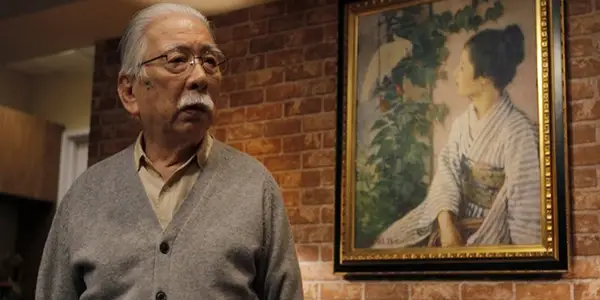LIKE SOMEONE IN LOVE: A Threefold Deconstruction Of Love

Joseph is an Austro-American media and communications student currently living…
Love is a fickle thing. To some, it is a feeling that pushes boundaries. Some may consider it to change from culture to culture. Yet this fickle feeling that should bring us joy can also be the reason we tear each other apart. Love is universal yet one of a kind. It is a paradox that haunts our daily lives. No matter how much we try, it will always be a constant in our life, no matter if we are students, working or retired. It is the one constant that follows us through our lives and haunts us.
Like Someone In Love shows how this concept changes from person to person. Does this film prove a diversity within a feeling? Is this another romantic-comedy, or a much darker tale?
A Multicultural Perspective
This film is fascinating from a production perspective. The film only features Japanese actors. Filming took place on location in Tokyo with a very distinct Japanese feeling. Yet when we see the credits at the beginning of the film, they are in French. At that moment you come to realize this is a French-Japanese production. Yet the film feels like it inspired by Japanese culture. France is famous for its love, so the connection is within the topic. Yet at the end of the film you completely forget that connection, as the film shows no sign of it. Adding to the confusion is that the director and writer is Abbas Kiarostami, who is from Iran. This Frankenstein monster of a film somehow manages to work.

The film is simple in nature. Young Akiko (Rin Takanashi) is a young student, who works as a sex worker in Japan. One night, she meets Takanashi Watanabe (Tadashi Okuno) as part of her job. This adds pressure to her as her jealous boyfriend is catching on to her. The widowed professor Takanashi asked for her only so that he can have dinner with him. At one point, her boyfriend Noriaki (Ryô Kase) gets involved. Believing he is her grandfather, a series of misunderstandings collect. That is the story, as it is about these characters and their lives. Also, this film is about each characters view of love.
In the beginning it was easy to say that love is universal, but also very specific. This film manages to offer three distinct views on what love can be, or what we wish it was. It is easy to structure this how the film does it, character to character. A fascinating element of this film is how it uses the classic three act structure. Each time an act comes to an end, a new character takes over.
Love In Three Acts
The character that holds the entire film together, Akiko, is a rather sad depiction of love. She is stuck in a bad relationship, works as a sex worker, and seems to have given up on love. Her boyfriend, Noriaki, is controlling, so she does not feel safe. Sex is something she does for payment, but finds no joy in. Even worse in a beautiful yet depressing sequence, we see her leave her family behind. Faced with unconditional love, she cannot bring herself to accept it. She seeks freedom in being alone, but loses herself in it.

Then there is Takanashi, who seeks love out loneliness. After his wife has passed away, his apartment shows that he lost himself in his work. Now he feels too old to find love, he tries other ways to do so. Yet while he did hire Akiko for the night, it was never meant to be a physical relationship. He went out of his way to know who she was, prepared a classic dish from her hometown and wanted a nice evening. His love was not meant to be something physical, he wished to feel that feeling once more. He wanted to be like someone in love.
Noriaki is the darker side of love. He believes that love is something unconditional. His love for Akiko trumps her own feelings. Their relationship is rocky, so the only move forward is marriage. To him, this will fix all their problems. Building upon very traditional views of romance, he becomes stuck. She is the love of his life and he will not lose her at any costs. It is bizarre to see this young man acting the way he does. His view of love is very one-sided. As a man, he believes that his love is all they need to make a relationship work. Never questioning his believes for one second, even if it is that very view that is keeping them apart. The biggest problem comes from the realization that he has no idea about what she does. He does not trust her at all, but as the audience we cannot deny that he has all the right to.
A View Of Simplicity
These views of love come through simple actions from the characters. This simplicity seems to to take inspiration from director Yasujiro Ozu’s work. His focus relied on framing characters in simple yet realistic environments. Minimalism shows itself in the sets. There is little movement in this film, as it all happens within about 24 hours. The film evolves the concept of Oners. Many shots go on without any real breaks taken. One shot that summarizes this film is when Akiko sits in a cab. She is driving away from a bar towards an unknown destination. In this taxi, we slowly see her break down, as she listens in on missed calls from the whole day. We see her fight with the decision of doing her job, or following her heart. She is trapped in an endless cycle that is destroying her life.

There is a car motif throughout the film. Many sequences take place either in a car or a cab. It could be done to show how life constantly moves forward no matter our decisions. We can make terrible or great decisions but life only stands still for short times. We cannot avoid the disparity that is our life. The film forces us to sit down and watch these situations. We see a young girl tear herself apart. A man who is blindly believing whatever he wants to. Another lonely old man seeking company in all the wrong places. The film is a beauty of simplicity that ends just as it begins. It forces the viewer to question what it is like to be like someone in love. How does love change us, and what does it mean for us?
Does content like this matter to you?
Become a Member and support film journalism. Unlock access to all of Film Inquiry`s great articles. Join a community of like-minded readers who are passionate about cinema - get access to our private members Network, give back to independent filmmakers, and more.
Joseph is an Austro-American media and communications student currently living in Austria, who grew up with film most of his life. Having won a new appreciation of cinema as an art form and as an industry, he aims to learn as much about it as he can.













